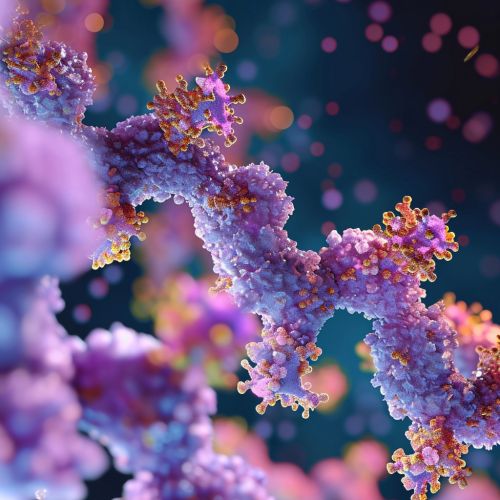Tyrosine kinase
Introduction
Tyrosine kinase is a type of protein kinase, an enzyme, that transfers a phosphate group from ATP to a protein in a cell. It functions as an "on" or "off" switch in many cellular functions. Tyrosine kinases are a subgroup of the larger class of protein kinases that are known to modify other proteins by chemically adding phosphate groups to them (phosphorylation). Phosphorylation usually results in a functional change of the target protein (substrate) by changing enzyme activity, cellular location, or association with other proteins.


Classification
Tyrosine kinases can be divided into two main types: receptor tyrosine kinases (RTKs), which are associated with cell membrane receptors, and non-receptor tyrosine kinases (NRTKs), which are not associated with receptor molecules.
Receptor Tyrosine Kinases
Receptor tyrosine kinases (RTKs) are a type of transmembrane proteins with an intracellular kinase domain and an extracellular domain that can bind ligands, i.e., signaling molecules. RTKs play critical roles in various biological processes, including growth, differentiation, metabolism, and apoptosis.
Non-Receptor Tyrosine Kinases
Non-receptor tyrosine kinases (NRTKs) are soluble proteins that are often found in the cytoplasm, nucleus, and even bound to the inner leaflet of the plasma membrane. They are involved in a variety of signaling pathways that control cellular proliferation, survival, migration, and differentiation.
Function
Tyrosine kinases play an important role in the modulation of growth factor signaling, which is critical for cellular proliferation, differentiation, and metabolism. They are also involved in the regulation of cell cycle progression, apoptosis, and cell metabolism. The activity of tyrosine kinases is tightly regulated, and dysregulation of their activity can lead to a variety of diseases, including cancer.
Role in Disease
Dysregulation of tyrosine kinase activity can lead to a variety of diseases. For example, overactivity of certain tyrosine kinases can lead to the development of cancers, including leukemia, non-small cell lung cancer, and breast cancer. Mutations in tyrosine kinases can also lead to developmental disorders and diseases such as diabetes and atherosclerosis.
Therapeutic Target
Due to their critical role in cellular signaling and disease, tyrosine kinases have become important targets for therapeutic intervention. Tyrosine kinase inhibitors (TKIs) are a class of drugs that block the action of tyrosine kinases. These drugs have been used successfully in the treatment of several types of cancer and other diseases.
